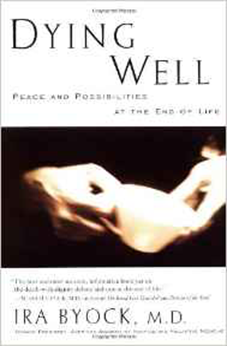Dying Well by Ira Byock MD

From Ira Byock, prominent palliative care physician and expert in end of life decisions, a lesson in Dying Well. Nobody should have to die in pain. Nobody should have to die alone. Dying Well brings us to the homes and bedsides of families with whom Dr. Byock has worked, telling stories of love and reconciliation in the face of tragedy, pain, medical drama, and conflict. Through the true stories of patients, he shows us that a lot of important emotional work can be accomplished in the final months, weeks, and even days of life. It is a companion for families, showing them how to deal with doctors, how to talk to loved ones—and how to make the end of life as meaningful and enriching as the beginning.
Ira Byock is also the author of The Best Care Possible: A Physician’s Quest to Transform Care Through the End of Life.
Editorial Reviews
Amazon.com Review
On his deathbed, faced with creditors and unpaid bills, Oscar Wilde said despairingly, “I am dying beyond my means!” If only the poor, beleaguered genius had read this book! None of us gets out of here alive, but reading this book will lessen your fear of the ultimate end and give you some guidance about enjoying your life to the fullest right up until your final moment. Do people really enjoy life in the face of death? People do. The stories of individuals in Dr. Byock’s book will move and inspire you to change your feelings about the end of your life, and also your feelings about your life in the present.
From Publishers Weekly
Copyright 1996 Reed Business Information, Inc.


Leave a Comment
You must be logged in to post a comment.